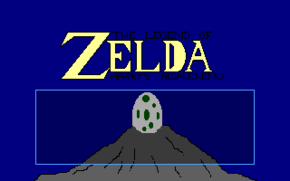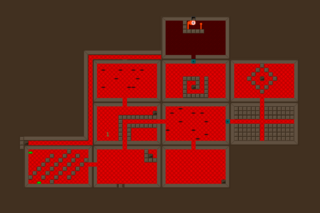The Legend of Zelda: Harry's Awakening
Release type: Incomplete
Release date: N/A
Levels: 12
Author: T3 Software
Website: T3 Software
Related games: Link vs. Gannon, Overworld
At its core, Game-Maker is built for top-down Zelda-style adventure games. It abides platformers, and allows whatever else one is clever enough to squeeze out of it, but the ideal Game-Maker game is probably a stripped-down Startropics.
So it is that Zelda clones are a popular item of experimentation. In most cases, the idea seems less to produce a fan game than to test the engine's limits and to see how well it can replicate something familiar. Of those experiments, Harry's Awakening is one of the more ambitious and well-executed.
The model here is, of course, the 1993 Game Boy game Link's Awakening. According to rumor, this fourth Zelda game is actually a reconfigured prototype for a third NES Zelda, scrapped in favor of Link to the Past on the SNES. Indeed, Link's Awakening does feel like a bridge game. There are strong elements of the first NES Zelda, embellished by a few details from the SNES game.
Likewise, with its hand-holding structure, tutorial owl, and self-reflexive humor, Link's Awakening often feels like a prototype for the 3D incarnations of the series. So in a sense, Awakening is the nexus of the whole Zelda series.
Harry's Awakening follows the original as closely as possible, as far as designer Todd Cope felt like continuing. The game covers the town, the beginning area by the shoreline, a bit of the Lost Woods, and Tail Cave. Not all of the building and tunnel entrances are navigable, but the important ones tend to be. The map layout is often different from the original, and Harry is of course in full color. The player can find a sword, bombs, and magic dust. Bushes may be slashed. It all plays much as one would expect.
The only odd quirk is in the control mapping. To allow attack animations, the game uses directional attacks, with each direction assigned its own key -- sort of a Robotron style configuration. This on its own is workable, and indeed common with Game-Maker projects. What makes it a little awkward is the choice of keys. Instead of bunching the attacks together in a close formation, as with the WASD keys, the four directionals are scattered across the right side of the standard keypad. For personal use, a slight control remap makes all the difference.
Although Harry gets few points for originality, that seems hardly the point. For technical implementation, Todd Cope pretty much nailed it. One wonders about the takeaway from this experiment.
Instructions
- Walk: Arrow keys / numerical keypad
- Run: Arrow keys / numerical keypad (Requires boots)
- Pick up items: P
- Slash right: \ (Requires sword)
- Slash left: / (Requires sword)
- Slash up: [Backspace] (Requires sword)
- Slash down: [Enter] (Requires sword)
- Throw powder: [Space] (Requires powder bag)
- Set bomb: B
Credits
Design: Todd Cope
Engine: Recreational Software Designs
Background
- This game was based on Link's Awakening for the Game Boy. The world map was basically a direct copy of that found in Link's Awakening. There were a few modifications that were a result of RSD Game Maker's limitations. The dungeons did feature original designs and original bosses.
Links
Misc. Links
Downloads
- The Legend of Zelda: Harry's Awakening (314.0 kB)
- Overworld map (101.1 kB)
- Tail Cave map (23.8 kB)
- Interior rooms map (31.1 kB)


